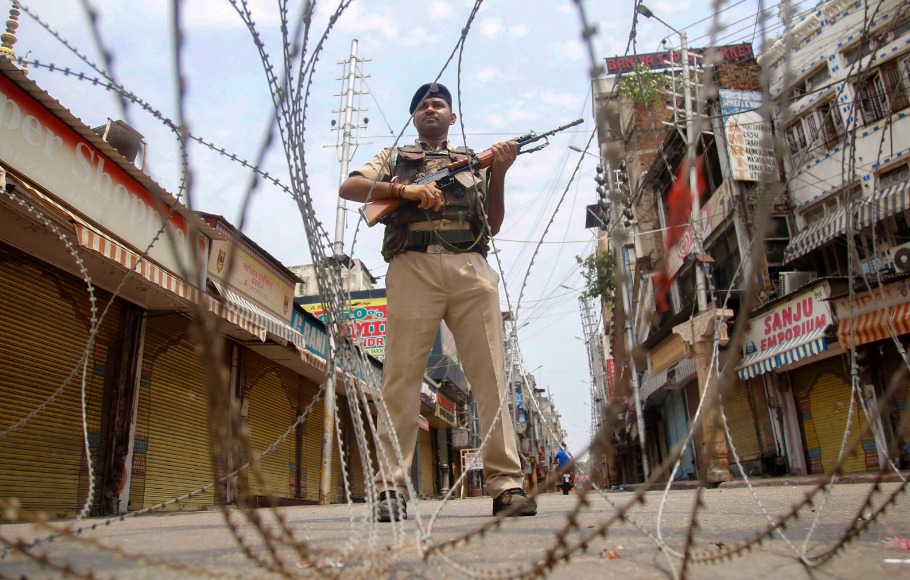
Kashmiri journalists slam prolonged internet ban, seek unified action
Journalists from Kashmir on Monday urged the authorities to ensure uninterrupted internet to the media fraternity so that they can discharge their duties without any form of censorship or fear. The call comes in the wake of the unprecedented internet clampdown, in force for 156 days now, in Kashmir.

Journalists from Kashmir, on Monday (January 6), urged the authorities to ensure uninterrupted internet to the media fraternity so that they can discharge their duties without any form of censorship or fear.
The call comes in the wake of the unprecedented internet clampdown, in force for 156 days now, in Kashmir.
Leading editors, journalists, reporters, and video and photojournalists affiliated to various media organisations in Kashmir held a peaceful sit-in on the Kashmir Press Club (KPC) premises to press for their demand.
In a seminar organised by the KPC, top editors and journalists spoke of the difficulties they have been facing in the absence of internet. Journalists drew parallels with Stalin’s Russia and Zia’s Pakistan.
Also read | Unplugged from the world, Kashmir still awaits normalcy
Journalist Peerzada Ashiq said after the scrapping of Jammu and Kashmir’s autonomy and statehood (on August 5), the situation was akin to ‘Stalin’s Russia and Zia’s Pakistan.’
“The post August 5, 2019 situation in Kashmir is, indeed, unprecedented. Even in the early 1990s the media in Kashmir did not face such curbs. We have to also see what happened to those who summoned the courage to speak up or write in an objective manner,” Ashiq said detailing how several journalists in Kashmir were summoned by the police for questioning and forced to reveal their news sources.
“Internet is a major communication tool for journalists to gain access to information, for research, and to file their stories,” he said, adding that in today’s age, ‘not the pen [but] the internet is mightier than [the] sword.’
Representatives of the Kashmir Editors’ Guild (KEG) also spoke at the seminar. Haroon Rashid Shah, editor of Urdu daily Nida-i-Mashriq, represented the KEG.
Also read | Relief for Valley: Centre restores SMS services after five months
Shah said Kashmir’s media fraternity left the Jammu-based English daily Kashmir Times to fight it out alone when the newspaper’s executive editor (Anuradha Bhasin) filed a petition in the Supreme Court challenging the internet ban and media gag.
“What did we do when Kashmir Times chose to fight and resist? We left it alone in its struggle,” Shah said, adding that what Kashmiri media lacked was cohesiveness and unity of strength when it mattered the most.
Lamenting the continued ban on internet in Kashmir, he said, “Perhaps the government considers Kashmir media as part of the problem. That is why Kashmiri journalists are denied access to internet.”
Young video journalist Shafat Farooq criticised the editors when the circumstances were too trying. He said it was the reporters who faced the heat and many of them working for various local media outlets either lost their jobs or took major cuts in their salaries.
Also read | Journalists in Kashmir protest against assault, abuse by local police
“This was perhaps because the editors are more interested in securing government advertisements than care for quality journalism,” Farooq said. He also said ‘self-censorship’ was very evident in Kashmir.
Bashir Manzar, editor of the Srinagar-based Kashmir Images, said it was wrong to solely blame the editors for it was they who understood the ‘unwritten rules’ and ‘appreciated the red lines.’
“It is true that authorities may not tell you directly what to do or what not to, but the editors functioning in a conflict zone know the red lines,” Manzar said. “Today, I know what is happening in San Fransico, not what is happening in Sopore,” he added.
Journalist Naseer A. Ganai said local editors were faced with an unprecedented situation and could not perform their duties as was expected of them. It was the local journalists from Kashmir who filed excellent reports from the ground in extremely trying circumstances, Ganai said.
Also read | Prolonged e-curfew stops beats of Save Heart Kashmir Initiative
Television commentator Majid Hyderi said he was denied his right to livelihood for the past five months. He suggested that the KPC should approach the J&K High Court for restoration of internet and that media organisations should send a representation to Lieutenant Governor G.C. Murmu.
Senior journalist Shahnawaz Khan questioned the role of the local media in the scrapping of Jammu and Kashmir’s autonomy and statehood.
“Collectively, we failed as media fraternity. When asked to bend, we not only crawled, we also kneeled down,” Khan said.
Apart from the KEG, the Kashmir Press Photographers’ Association (KPPA), the Kashmir Working Journalists’ Association (KWJA), the Kashmir Federation of Video Journalists, the Anjuman Urdu Sahafat, and the Kashmir Union of Working Journalists took part in the protest.

